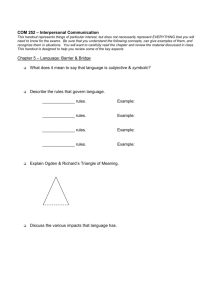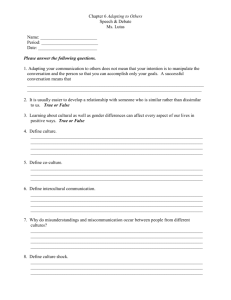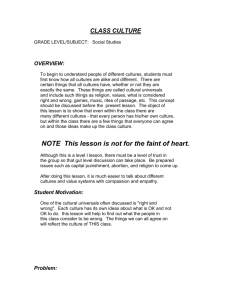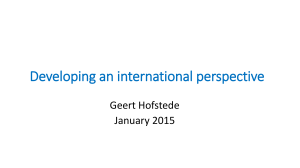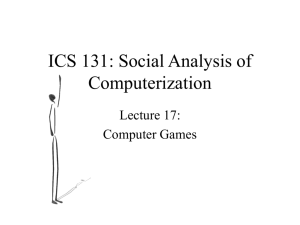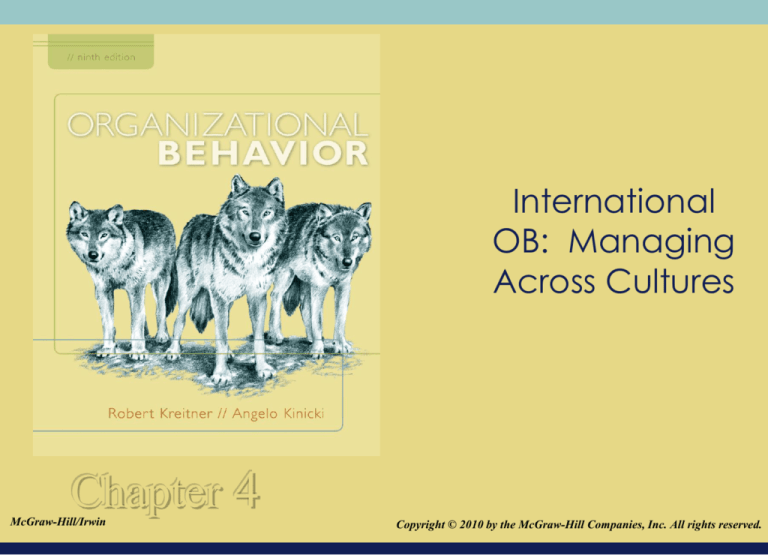
International
OB: Managing
Across Cultures
Chapter 4
McGraw-Hill/Irwin
Copyright © 2010 by the McGraw-Hill Companies, Inc. All rights reserved.
© 2008The McGraw-Hill Companies, Inc. All rights reserved.
Ch. 4 Learning Objectives
1. Define the term culture, and explain how societal
culture and organizational culture combine to
influence on-the-job behavior.
2. Define ethnocentrism, and explain how to develop
cultural intelligence.
3. Identify and describe the nine cultural dimensions
from Project GLOBE.
4. Distinguish between individualistic and collectivist
cultures, and explain the difference between
monochronic and polychronic cultures.
4-2
Ch. 4 Learning Objectives
5. Specify the practical lesson from the Hofstede crosscultural study.
6. Explain what Project GLOBE researchers discovered
about leadership.
7. Explain why US managers have a comparatively
high failure rate on foreign assignments.
8. Summarize the research findings about Northern
American women on foreign assignments, and tell
how to land a foreign assignment.
9. Identify four stages of the foreign assignment cycle
4-3
and the OB trouble spot associated with each.
Culture
Culture is: a set of
beliefs and values
about how people
should and do act
It involves “taken for
granted assumptions”
• We do not
understand that we
do not understand
4-4
Cultural Influences on OB
Organizational
culture
Economic/technological
setting
Political/legal
setting
Ethnic
background
Religion
Societal Culture
Personal
values/ethics
Customs
Attitudes
Language
Assumptions
Organizational
behavior
Expectations
4-5
Your Experience
I have worked with people of other
cultures at work or school.
•A=Yes, B=No
I have experienced a conflict or
been frustrated when working with
people of other cultures.
•A = Yes, B=No
4-6
Your Experience
The conflict I experienced was due
to cultural differences.
•A=Yes, B=No, C= I don’t know
Learning about different cultures is
interesting to me.
•1=Strongly Disagree, 3= Neutral,
5= Strongly Agree
4-7
Cultural Intelligence
Cultural intelligence
The ability to interpret
ambiguous crosscultural situations
accurately.
Involves:
Recognizing different values
and practices
Understanding the meaning
of others’ actions
Perspective on one’s own
ways
4-8
Ethnocentrism: A Cultural Roadblock
Ethnocentrism is the
belief that one’s native
country, culture,
language, and modes
of behavior are
superior to all others
How do you overcome
this?
4-9
Test Your Knowledge
A high performing manager was chosen
for a foreign assignment. She tells a
colleague “I plan on just doing business
the way I always do. Why change what
works?” People in the new culture may
perceive her to be….
a. Ethnocentric
b. Culturally intelligent
4-10
High vs. Low Context Cultures
High-Context
Rely heavily on
situational cues for
meaning
What characterizes
high-context cultures?
What countries have
high-context cultures?
Low-Context
Meaning is derived from
the written and spoken
word
What characterizes lowcontext cultures?
What countries have
low-context cultures?
4-11
Contrasting High-Context & Low-Context
Cultures
4-12
Cultural Dimensions from the GLOBE Project
Power Distance
Uncertainty Avoidance
Institutional Collectivism
In-group Collectivism
Gender Egalitarianism
Assertiveness
Future Orientation
Performance Orientation
Humane Orientation
4-13
Countries Ranking in GLOBE Dimensions
4-14
Individualism vs. Collectivism
Individualistic
“I” and “Me” cultures
Priority given to
individual freedom
and choice
Example countries?
Collectivist
“We” and “Us” cultures
Rank shared goals higher
than individual desires and
goals
Subordinate their own
wishes and goals to those of
the relevant social unit
Example countries?
4-15
Cultural Perceptions of Time
Monochronic
Preference for doing
one thing at a time
because time is limited,
precisely segmented,
and schedule driven.
What characterizes
monochronic cultures?
What countries have
monochronic cultures?
Polychronic
Preferences for doing
more than one thing at a
time because time is
flexible and
multidimensional.
What characterizes
polychronic cultures?
What countries have
polychronic cultures?
4-16
(distance in feet)
US Interpersonal Zones
Interpersonal Distance Zones
Public
12.0
Social
4.0
Personal
1.5
Intimate
0
Arab
Asian +
Latin
American
Cultures
North
American +
Northern
European
4-17
Test Your Knowledge
Cultures in which people tend to get
right to the point would be considered:
a. Polychronic
b. Proxemics
c. High context
d. Low context
4-18
Cultural Dimensions: Hofstede Study
Power Distance How much do people expect
inequality in social institutions?
Individualism- How loosely or closely is the
person socially bonded?
Collectivism
MasculinityFemininity
Uncertainty
Avoidance
Does the person embrace
stereotypically competitive,
masculine traits or nurturing,
feminine traits?
How strongly does the person desire
highly structured situations?
4-19
Test Your Knowledge: How did the
US score?
A= True, B= False
1. The US scored relatively high in
individualism.
2. The US scored high in femininity.
3. The US scored low on uncertainty
avoidance.
4-20
Leadership Attributes - GLOBE
4-21
Foreign Assignments
Would you consider
taking a foreign
assignment for a 6 months
to 1 year duration?
•A=Yes, B=No
Expatriates – Anyone
living or working in a
foreign country
4-22
Why U.S. Expatriates Fail on Foreign
Assignments
Personal and family
adjustment problems
Homesickness
Lack of:
•
•
•
•
Cultural adaptability
Patience
Flexibility and
Tolerance for other’s
beliefs
4-23
North American Women on Foreign
Assignments
Proportion of female
expatriates has grown
Barriers: Selfdisqualification and
assumption that women
would not be welcomed
Viewed as foreigners first,
then as women
4-24
Tips for Landing a Foreign Assignment
While in school, pursue foreign study opportunities and
become fluent in one or more foreign languages
From first interview, clearly state your desire for a foreign
assignment
Become very knowledgeable about foreign countries where
you would like to work
Network with expatriates in your company
Be visible
Stay informed about company’s international strategies and
programs
Polish your cross-cultural communication skills
4-25
The Foreign Assignment Cycle
(with OB Trouble Spots)
Home Country
Experiences
1.
Selection &
training
“unrealistic
expectations”
Foreign Country
Experiences
2.
Arrival &
adjustment
“culture
shock”
Reassignment
4.
Returning
home &
adjusting
“reentry
shock”
3.
Settling in &
acculturating
“lack of
support”
4-26
Key Cross-Cultural Competencies
4-27
Test Your Knowledge
When Peter becomes aware of practices different
than his own, he tries to perceive things in a
different cultural context. He also reminds himself
to look at his own practices from the perspective of
those from different cultures.
Based on this vignette, is Peter demonstrating
cross-cultural competence?
• A. Yes
• B. No
4-28
International
OB: Managing
Across Cultures
Supplemental
Slides
Chapter 4
© 2008The McGraw-Hill Companies, Inc. All rights reserved.
International OB:
Think Globally; Act Locally
4-30
International OB:
Think Globally; Act Locally
Walmart’s Business Model in China
• In city centers, multi-level buildings
• Offer fresh food
4-31
International OB:
Think Globally; Act Locally
Walmart China - Emphasizes good will in community
•“Retailtainment”
•School children
visits
•Play area in
store
•Book readings
4-32
Importance of Culture - Disney
“We’re also shifting our look at the
world a lot. People have been misled by
access to new markets to think that there
is a homogeneous, one-world culture.
We’ve discovered that pride in local
culture and demand to won it is much
greater than we had previously
thought.” ~ Bob Iger, CEO Disney
Source: Siklos, R. The Iger Difference; Fortune, April 28, 2008, pg. 90-94.
4-33
Global Corporate Evolution
Domestic MultiPhase
domestic
Phase
Multinational
Phase
Global
Phase
Competitive
strategy
Domestic
Multi-domestic
Multinational
Global
Importance of
world business
Marginal
Important
Extremely
Important
Dominant
Primary
orientation
Product/
Service
Market
Price/Cost
Strategy
Product/ Service
New, unique
More standardized
Completely
standardized
(commodity)
Masscustomized
Type of
development
emphasized
Product
engineering
Process
engineering
Engineering not
emphasized
Product and
process
engineering
Source: Adler, N. J., & Gundersen, A. (2008). International Dimensions of Organizational Behavior, Fifth Edition, Thomson; Mason , OH.
4-34
Global Corporate Evolution
Domestic MultiPhase
domestic
Phase
Multinational Global
Phase
Phase
Technology
Proprietary
Limited sharing
Widely shared
Almost
instantly and
extensively
shared
R&D/Sales
High
Decreasing
Very low
Very high
Profit margin
High
Decreasing
Very low
Initially high,
yet
immediately
decreasing
Competitors
None
Few
Many
Significant
Market
Small and
domestic
Large and multidomestic
Larger and
multinational
Largest and
global
Source: Adler, N. J., & Gundersen, A. (2008). International Dimensions of Organizational Behavior, Fifth Edition, Thomson; Mason , OH. ;
4-35
Global Corporate Evolution
Domestic MultiPhase
domestic
Phase
Multinational Global
Phase
Phase
Production
location
Domestic
Domestic and
primary foreign
markets
Multinational,
based on least cost
Global, least
cost and best
quality
Exports
None
Growing, high
potential
Large, saturated
Imports,
exports, and
“transports”
Structure
Functional
divisions
Functional with
international
division
Multinational
lines of business
Global
alliances,
flattened
“heterarchy”
Structure
Centralized
Decentralized
Centralized
Coordinated
and
decentralized
Source: Adler, N. J., & Gundersen, A. (2008). International Dimensions of Organizational Behavior, Fifth Edition, Thomson; Mason ,
OH.
4-36
Discussion Questions
What trends to you notice as
companies expand internationally?
What management challenges
might be present at each phase?
4-37
International Business Trends
Historic approach
Headquarters,
functions, and capital
were in one place
Manager dispatched to
run regional operations
Replication of domestic
operations in other
places
Geocentric Organizations
Move work to the right
places with the right talent
Organized around hubs of
expertise (e.g., Lenovo)
“You operate as if there’s
just one time zone…and
you’re always on” CEO of
Lenovo, William J. Amelio
Source: McGregor, J. & Hamm, S. Managing the Workforce, BusinessWeek, January 28, 2008
4-38
Video Cases
Cirque du Soleil
Disney Imagineering
4-39
Management in the Movies
Gung Ho – “Assan Motors”
In this scene, Stevenson has finally found his meeting
with the Assan Motors executives. He sets up and
begins his proposal to bring Assan Motors to
Hadleyville.
What would you have done differently than
Stevenson?
What decisions should the executives consider before
opening a plant in the U.S.?
4-40
Managers Hot Seat:
Let’s Break a Deal
Characters:
• Michael Sokolow - Mustang Jeans - US
• Norio Tokunaka - Popwear - Japan
Which cultural differences played a major role in this
interaction?
Both individuals acted according to their cultural
norms. Who should have the responsibility for
changing their style to work most effectively?
4-41
Tips for Business Traveler’s
Make Packing a Reflex Action
• Pack the same items in the same way for every trip
Get Briefed
• Research latest economic and business information on
the country you’re visiting
Stick to top Business Hotels
• They have excellent business centers; health clubs; and
prestige that has influence with locals
Source: McGovern, P. (2007, April) How to be a Local, Anywhere, Inc. Magazine
4-42
Tips for Business Traveler’s
Arrive Early
• Take a day or two to walk around and get “in tune” with
the people, pace, and culture
Bear Gifts
• In Asia, Latin America, and Africa present your host
with a simple gift
Practice Humility
• Don’t boast about your company or accomplishments
• Talk about your children and their’s and your
participation in philanthropic activities
4-43
Ethical Dilemma: China
China has an immense patient population
with a variety of health problems (cancer,
diabetes, infectious diseases)
• 160 million Chinese people have the hepatitis virus
• China has 44% of the world’s total number of cancer
cases
Testing new drugs is less expensive and easier
to recruit patients than in the US
Source: The Rush to Test Drugs in China, Bruce Einhorn, BusinessWeek, May 28, 2007
4-44
Ethical Dilemma: China
China
US
1-day in hospital
$40-$100
$750-$1,000
MRI
$150-$300
$1500-$3000
Yearly Oncologist
Salary
$40,000 & up
$225,000 and up
Cost of new drug
development
$120 million
$1 billion
Source: The Rush to Test Drugs in China, Bruce Einhorn, BusinessWeek, May 28, 2007
4-45
Ethical Dilemma: China
But…..
• People recruited into drug trials aren’t always wellinformed
• Ethical questions regarding stem cell injections and
treatments that alter patient’s genes and trafficking
human organs make China a less attractive option
Source: The Rush to Test Drugs in China, Bruce Einhorn, BusinessWeek, May 28, 2007
4-46
MTV International Strategy
“Mix youth sensibilities with local
tastes”
Don’t come across as a “cultural
imperialist”
Buy local businesses
4-47
MTV: World Tour
Countries
Subscribers 1st Qtr 2005 in
Millions
MTV Asia
140.1
MTV Europe
125.1
MTV United States
87.6
MTV Russia
27.1
MTV Brazil
18.0
MTV Latin America
13.7
MTV Canada
0.8
MTV Japan
5.4
MTV Australia
1.0
4-48
Test Your Knowledge: Culture Quiz
Which of the following is true?
a. Chinese managers find U.S. workplaces comfortable
and natural.
b. Chinese managers find interpersonal communications
to be more blunt than in China.
c. Chinese CEO’s usually delegate more responsibility to
their subordinates than Americans expect.
d. Chinese managers are keenly aware of laws on sexual
harassment and equal opportunity and are experienced
at handling them.
4-49
Test Your Knowledge: Culture Quiz India
"So, does this agreement meet with your approval?"
you finally ask your Indian business colleague
across the table, after having spent several hours
negotiating an important deal. You believe you are
very close to an understanding but are
disappointed that your Indian colleague begins
shaking his head, indicating he does not agree with
you. "What else can we do for you?" you ask,
feeling let down and disappointed. "Nothing," he
replies. How could this have gone so wrong?
Taken from
http://tools.monster.com/archives/culturequizzes/
4-50
Test Your Knowledge: Culture Quiz –
India (cont.)
A. Your problem comes from spending so much time at
the table with your Indian colleague. In India, business
meetings should last no more than one hour per
session.
B. In business negotiations in India, agreements must be
approved by all people affected by the agreement,
which typically means many others who may not have
been present at the preceding negotiations. Therefore,
asking whether the agreement 'meets with your
approval' at the end of the negotiations reflects your
naiveté and caused your Indian colleague to lose
respect for you.
4-51
Taken from http://tools.monster.com/archives/culturequizzes/
Test Your Knowledge: Culture Quiz –
India (cont.)
C.
Indian businesspeople usually never sign paper agreements at
the end of a negotiation. This is typically left for the solicitor, or
attorney, and occurs over a period of several months after the
negotiations are over. You simply should not have asked the
question.
D. You have an agreement; don’t worry! Your Indian colleague
was not indicating disagreement to your question. You were
misreading your Indian colleague’s nonverbal behavior. When
Indians wobble their heads from side to side, in what
sometimes looks like the 'no' sign to westerners, they are
merely indicating they are listening thoughtfully to your
statement. More often than not, it means they acknowledge and
agree with what you are saying
Taken from http://tools.monster.com/archives/culturequizzes/
4-52
Test Your Knowledge: Culture Quiz Germany
You have made a trip to Frankfurt and you have been
eager to see one particular client who has been difficult
to meet, and you finally get an appointment for 9 a.m.
the next day. However, on your way to the meeting, you
hit terrible traffic, and arrive at your appointment 20
minutes late. The door is closed, and the meeting room
is filled with a certain chilliness that surprises you.
"After all," you think to yourself, "what is 20 minutes
when I’ve come across the ocean? I guess they are just
looking for a way out of doing business with me." The
meeting never seems to get going after that.
Taken from http://tools.monster.com/archives/culturequizzes/
4-53
Test Your Knowledge: Culture Quiz –
Germany (cont.)
A. You are correct. They do not want to meet with you and are just
using your lateness as an excuse to not do business with you.
B. They probably do want to meet with you but expect you to be able
to stay for lunch: It is critical in Germany that all first meetings with
new people include lunch.
C. It is an old-fashioned custom in some traditional businesses in
Germany never to schedule meetings involving possible new
ventures in the morning (as the morning is the time to get things
done that are already needing attention, not new business deals,
which might be risky). They probably do want to meet with you
but are feeling a little put out that you did not call to let them know
you were running late.
D. Germans organize their time carefully, so punctuality is an
important character trait, and something they look for in judging
4-54
potential business partners.
Test Your Knowledge: Culture Quiz Mexico
You are excited to finally be in Mexico City and
meeting your colleague, Carlos Cantu. You
extend your hand and say you are pleased to
meet him. However, Cantu suddenly pulls you
close to him and wraps you in a strong embrace.
You are a bit shocked and withdraw. You are
really put out when, after a wonderful dinner in
a restaurant near the Zocalo later that evening,
he takes your arm for a stroll down the street.
You wonder what Cantu can be thinking.
4-55
Taken from http://tools.monster.com/archives/culturequizzes/
Test Your Knowledge: Culture Quiz –
Mexico (cont.)
A.Calm down. Cantu simply greeted you with a
classic warm Mexican greeting: The abrazo,
or embrace. It signals nothing more than
genuine pleasure to know you. And, as a
close associate with whom he feels he has
developed trust, he is comfortable expressing
his friendship by strolling after dinner with
you, as friends might in Mexico, arm in arm.
This is a very good sign.
4-56
Test Your Knowledge: Culture Quiz –
Mexico (cont.)
B. You did absolutely nothing wrong by quickly
withdrawing from what was, perhaps for you, an
uncomfortable and unusual indication of an
unwanted advance.
C. Strolling arm in arm simply expresses his pleasure
that you picked up the bill at the restaurant. In
Mexico, if you did not pick up the bill, he would not
have taken your arm. As for the embrace earlier in
the day, think nothing of it. He was expressing
happiness that you were taking him out to dinner
later that night.
4-57
What International Managers Like to Do
Variable
U.S.
Australia
Italy
Leading
employees
1
1
5
Controlling
employees
10
9
9
Making
decisions
6
6
6
Negotiating
7
7
3
Networking
2
2
1
4-58
What International Managers Like to Do Cont.
Variable
Japan
Israel
Leading
employees
1
3
Controlling
employees
9
8
Making decisions
4
2
Negotiating
7
7
Networking
3
5
4-59
What International Managers Like to Do Cont.
Variable
U.S.
Australia
Italy
Innovating
3
3
4
Monitoring
4
5
2
Informing
others
5
4
7
Doing desk work
9
8
9
Handling time
pressures
8
10
10
4-60
What International Managers Like to Do Cont.
Variable
Japan
Israel
Innovating
2
1
Monitoring
5
4
Informing
others
6
6
Doing desk work
8
10
10
9
Handling time
pressures
4-61
The Polychronic Attitude Index
Strongly
Disagree
Disagree
Neutral
Agree
Strongly
Agree
I do not like to juggle
several activities at the
same time.
5
4
3
2
1
People should not try to do
many things at once.
5
4
3
2
1
When I sit down at my
desk, I work on one project
at a time.
5
4
3
2
1
I am comfortable doing
several things at the same
time.
1
2
3
4
5
4-62
The Polychronic Attitude Index
1.0
1.5
Monochronic
2.0
2.5
3.0
3.5
4.0
4.5
5.0
Polychronic
4-63
Guidelines for Behavior & Ethics in Foreign
Cultures:
Cultural Relativism
“When in Rome, do as
the Romans do”
Guiding Principles for
a Middle Ground
Cultural Imperialism
“The sun never set on
the British Empire”
Assumption: Each
Respect for core human
values, which determine
the absolute moral
threshold for all business
activities
Respect for local
traditions
The belief that context
matters when deciding
what is right and what is
wrong
Assumption: People in
culture is right in its
own way; there are no
international or
universal standards
Problems:
Morally inconsistent
Fosters “anything is
okay” attitude
all cultures should
follow one set of
behavioral and ethical
standards
Problems:
Morally arrogant
Insensitivity to local
cultural traditions and
tastes
4-64
Conclusion
Questions for discussion
4-65


